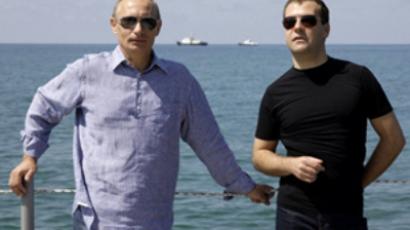Putin “is considering the possibility of returning as president”
Prime Minister Vladimir Putin has reportedly said he may consider taking part in the Russian presidential election in 2012. The news comes from a participant of the Valdai discussion club.
Putin apparently gave a signal that he “is considering the possibility of returning as president in 2012,” according to Aleksandr Rahr, director for Russia and Eurasia at the German Council on Foreign Relations, who is attending the event.“Answering our questions, he didn’t say that he won’t return, even though the occasion was there. I believe it’s the first time he has given such a signal,” Rahr told Itar-Tass news agency.
At the same time, Putin does not seem to be going to stand against the current Russian President Dmitry Medvedev in the upcoming election.Replying to a question of a possible political competition with the president, Putin said “there was none in 2008 and there will be none in 2012,” as cited by the head of the Russian government Nikolay Zlobin from the Washington-based World Security Institute.Speaking to RT, Zlobin added that Putin said he would coordinate his personal plans with those of Medvedev when the time comes, and also with the policy of the country’s ruling United Russia party, which the prime minister happens to head.“We’ll make a deal. We will see with Dmitry what the situation is. We are very similar people with similar views – we are people with the same blood,” – Zlobin quoted Putin as saying.RT’s political commentator, Peter Lavelle, believes that Putin would never run against Medvedev.“I don’t see that happening. We call them the tandem for a reason,” he said.However, he stressed that it would be premature to speculate on the subject:“A lot can happen in three years. Maybe Mr. Medvedev will lose popularity. We have to remember there’s another issue here. It’s the United Russia party. And we have to see where they are going, as well.”
The Valdai International Discussion Club is an annual gathering of the world’s leading journalists and media editors in Russia, where they can talk directly to top Russian officials on issues of policy-making and the international agenda. The discussion is usually held behind closed doors to downplay officialdom in the atmosphere.This year, the members of the Valdai Forum have been twice as lucky since President Dmitry Medvedev and Prime Minister Vladimir Putin both agreed to attend.
Iran and Netanyahu's visit to Moscow
Another issue that came up at the meeting concerned the rumors of Israeli Prime Minister Benjamin Netanyahu having secretly visited Moscow to talk about arms sales to Iran.According to RT’s correspondent, who was covering the events at the Valdai Forum, Putin neither confirmed nor denied the speculation. Instead, he advised journalists to work with the facts.Benjamin NetanyahuIt may, however, be that the talks could have concerned Wednesday’s security proposal that Tehran reportedly sent to the US, Russia, China, France, Britain and Germany in an attempt to reach out to the West.The next day, Russian Foreign Minister Sergey Lavrov made it clear that Moscow would not back any new rounds of tough sanctions against Iran in the UN Security Council, the Wall Street Journal reports. Lavrov also rejected a US-proposed timetable for securing progress from Iran on ending its nuclear-fuel program.Russia’s Foreign Minister stressed negotiations should begin without any imposed timetable, and even if Iran tried to make weapons-grade fuel, he said, it would be detected and there would be time to respond."I do not think those sanctions will be approved by the United Nations Security Council," Mr. Lavrov said.Explaining Russia’s position on the issue, Anatol Lieven, Professor at the Department of War Studies at London’s King’s College, said:“Russia certainly does not favor an Iranian nuclear program but does support peaceful Iranian nuclear developments. We didn’t hear this from the Prime Minister, you understand, but in general [Russia] asserts the right, in principle, to sell Iranian defensive weapon systems, but isn’t actually doing so at present, and strongly, categorically opposes any military attack.”In other words, Russia is not going to cut its relations with Iran, and it is not going to go be part of sanctions. But, if Iran is exposed, then Russia may change its position, Peter Lavelle concluded.
Russia not against reexamining causes of WWII
Another edgy question was asked about the legacy of World War II that was passed on to Russia by the USSR.Vladimir Putin said he did not protect Soviet diplomacy, but neither did he support attempts to speculate on history.“We're not against reexamining some of the events which led to WWII, but we want this examination to be objective. The world after WWI was rebuilt with mistakes. The Versailles agreement humiliated Germans. One can't humiliate other nations, especially such a great one as Germany. It later gave fascists the right to say – ‘They were unjust to us. We will take revenge!’,” Vladimir Putin said.The Russian Prime Minister continued, saying that having freed Europe from Nazis, the Soviet people could not give it freedom, because they weren’t free themselves.“There were prison camp inmates and those who opened prison camps in the USSR. Why blame one country for everything?” Putin said, as quoted by the Itar-Tass.“Nazi Germany was the aggressor. It is impossible to equal the victims and the hangmen,” he added.The topic of this year’s gathering is "Russia and the West: Back to the Future". The message is clear – the Cold War, as we knew it, is over; but are we going to see a warm peace or a cold one?To warm things up, a new global security architecture needs to be built – this is what President Medvedev has long been calling for.Members of the Valdai Forum will meet him on Monday in Yaroslavl for another Q&A on this, also.













